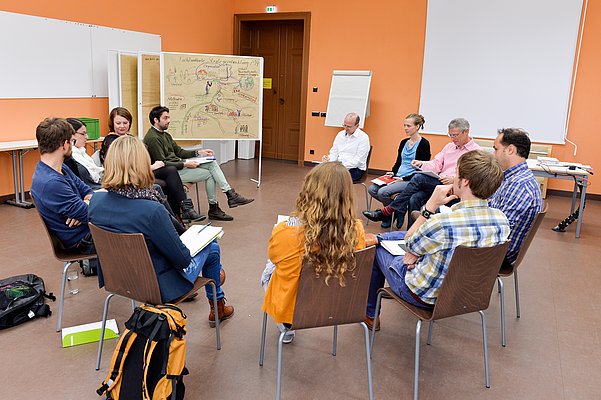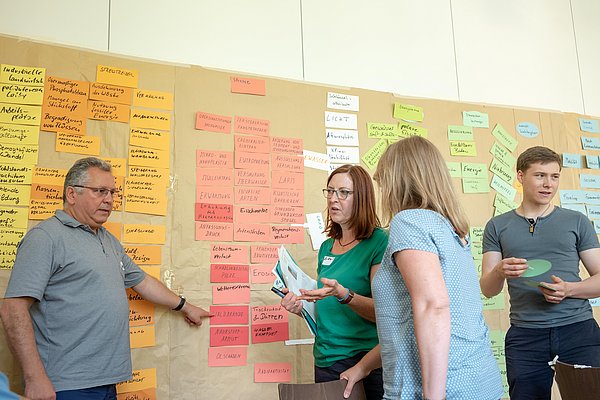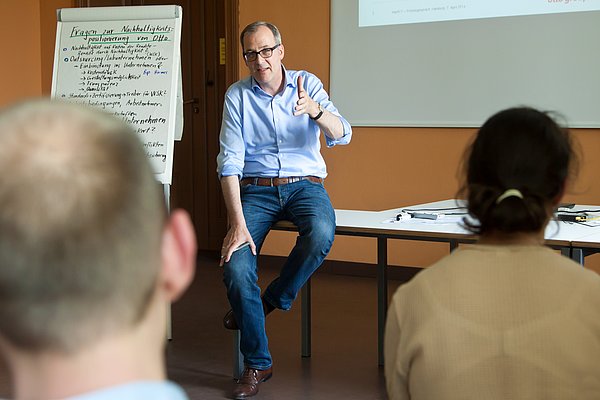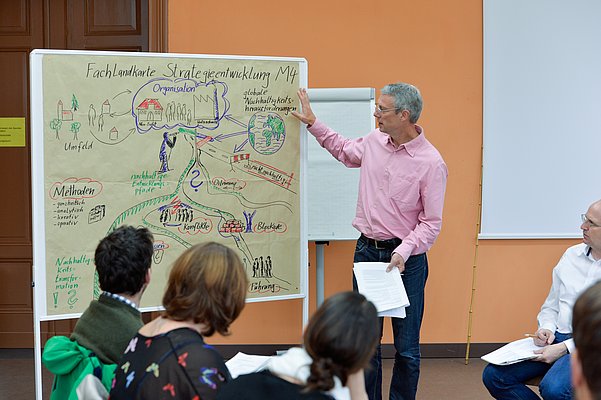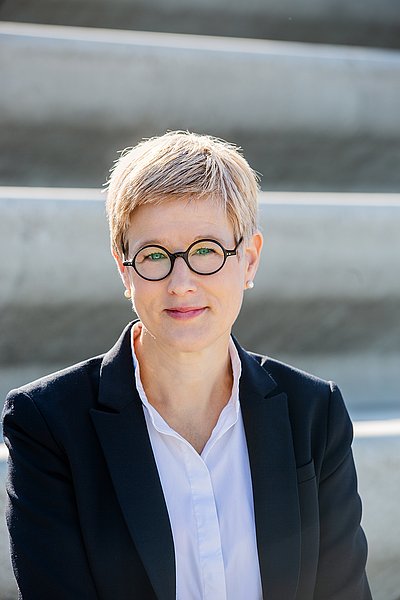Individual study contents
In the Master's programme Strategic Sustainability Management you will develop competences in the areas of sustainability and organisational change. You will systematically learn about the following areas:
- System perspectives and transformative methods,
- strategies and management concepts, and
- Process competence and personal development
The contents offered are interlinked over three semesters with your individual practical project (M3), which enables you to transfer directly from theory to your professional practice.
Modules per semester
Semester 1 provides you with an overview of sustainability challenges, concepts and strategies as a basis for professional work in sustainable development. You will develop the ability to understand complex interrelationships, to classify sustainability issues and to perceive -transformation as a design task.
Module 1 offers you a theoretical and practical overview of the current state of knowledge about sustainable development in business and society. We demonstrate the ability to holistic, systemic analysis of sustainability challenges and possible approaches to action.
Module 2 enables you to orientate yourself in the current sustainability discourse, to distinguish between different positions in terms of their values and frame of reference and to (re)position your organisation in the field of sustainable development .
In the qualification Module 3 Sustainability Project you develop a concrete project in three semesters (1.5 years) and implement it practically. In the first semester, you develop the project idea, describe the development opportunities and examine the risks that arise from it. You justify and define a project and clarify the concrete assignment with an organisation as a practical partner.
Target knowledge is the focus of the second semester. You will learn to develop specific sustainability strategies for different types of organisations (companies, non-profit organisations, public institutions (administration/municipality) and to link them to suitable management and implementation concepts.
In Module 4, you will learn about different methods for developing sustainability strategies and how to deal with contradictions. The aim is to gain a holistic understanding of strategy and thus align business and organisational models with societal sustainability challenges.
In Module 5 , you will learn about management approaches that can be used to implement sustainability strategies. You will learn to recognise their respective strengths and limitations as well as to identify and exploit scope for action in implementation. The aim is to assess the suitability of the instruments for a specific organisation and to be able to estimate their use and timing by way of example.
You underpin your project idea, e.g. for a business model, with a management plan and start the project implementation in coordination with actors from the organisations concerned.
In the third semester, you will be taught practical implementation and transformation knowledge. This includes process and leadership skills that are central to the successful implementation of organisational change processes.
In Module 6 you will be will be introduced to the psychological basics of change processes, change management and dealing with resistance, as well as the basics of environmental psychology. With this knowledge you will be able to analyse change processes on a personal, organisational and societal level towards sustainability and identify starting points for their initiation, design and support.
Module 7 focuses on your individual attitudes, values and competences in order to be able to competently take on and fulfil the demanding role as a change agent. Based on an individual competence profile, you will reflect on your personality and your own approach to change in order to recognise development potential and develop cooperative forms of leadership.
You design the implementation process and use process control methods to get support and resolve conflicts constructively. After completing the project, you evaluate your experiences.
The final Master's thesis provides you with the framework to deepen your knowledge of a topic in strategic sustainability management on a scientific basis. You can thus set a content-related focus for your own qualification.
FAQ study contents
You can take our part-time qualification programme "Strategic Sustainability Management" as a Master's degree programme (4 semesters), as a certificate programme (5 modules or 1.5 years) or individual modules (MicroDegrees). A change from individual modules to the certificate programme or the Master's programme is possible in consultation with the programme team. Further information on the application modalities can be found here.
Our offer is a blended learning offer - i.e. a combination of online learning phases and presence phases. During the online phases, you learn independently with the help of literature, videos or group assignments. In addition, there are occasional evening appointments.
The presence phases in particular are characterised by interactive work that cannot be "captured" with the help of recordings.
Due to the predominant professional activities of our students, our 3 attendance phases per semester usually take place from Wednesday to Saturday at the following times:
|
Wednesday |
9.30 - 18.30 |
|
Thursday |
9.30 - 18.30 |
|
Friday |
9.30 - 18.30 |
|
Saturday |
9.30 - 15.30 |
The following applies here: Good studyability alongside professional activities is important to us. A fundamental prerequisite for successful study is the regular use of the teaching/learning platforms and the materials offered on them.
E-learning in particular offers the opportunity to work on the materials and assignments independently of time and space. This will also work for group work in the form with the appropriate arrangement. Time off for weeks or even months is unfavourable for the success of your studies.
If possible, ensure transparency early on, talk to us or, for example, to your working group if there are problems. Then there will be an adapted solution.
You should plan on an average of about 12 hours per week - calculated over the entire year. There will be peaks before exams or homework deadlines, and the modules cannot be spread evenly over the year due to holiday periods, so that work-intensive and quieter phases alternate.
You earn 6 ECTS per module. One ECTS corresponds to 25-30 working hours, i.e. 180 hours per module.
Within these 180 hours, you will mainly work independently with literature, videos, group assignments, participate in the attendance days and online seminars and prepare for exams.
The time required can be reduced by the synergy of work and study, e.g. by planning and implementing a project in your own professional environment.
In principle, homework and oral examinations are relevant proof of performance. Thespecific form of examination envisaged for each module can be found in thestudy and examination regulations. As far as possible, we will link examinations to be taken in class with the regular attendance phases.
We strongly encourage you to attend the attendance events, but there is no obligation to attend. This means that you can still continue your studies. Materials distributed during the attendance phase (handouts, lecture notes, etc., if applicable) will be made available. However, we recommend that you use the opportunity of the attendance phases to deepen the contents and to enrich your everyday study life through the exchange with other students.
The module M3 "Sustainability Project" extends over 3 semesters of your studies and offers you individual design options. Ideally, the project is possible with your current employer or with a practice partner at your place of residence, as this simplifies the time implementation alongside your actual professional activity.
If this is not possible, you can, of course, also make use of contacts in the vicinity of the degree programme. In this case, we will find a solution together.
In exceptional cases, you can also work on the sustainability project in a group or team. However, your individual performance must be recognisable and assessable.
Before the start of each semester, dates for the attendance phases and online events (e.g. webinars) are announced on our website and our blog. announced.
Participation in the attendance events is not compulsory, but is highly recommended with regard to the module examination and the application-oriented joint processing of the learning material.
You can find concrete examples from the degree programme under the following link. A Master's thesis can address a wide range of issues - just as diverse and complex as the topics associated with the concept of sustainability and sustainable corporate management.
The tuition fee is a programme-specific amount due each semester. This is used to finance the analogue and digital courses, including all teaching staff, teaching materials, examinations and administrative support (study guidance). The continuing education programme must be completely financed by the tuition fees of the participants.
The tuition fee for the continuing education programme "Strategic Sustainability Management" is currently 2,750 € per semester. The semester fee is generally charged to each student of the HNEE upon enrolment or re-registration for the coming semester. It includes an administration fee (51 EUR), the student union fee (70 EUR) and the AStA fee (15 EUR). A semester ticket is currently not available for students of continuing education programmes.
In any case, a continuing education programme expands one's own professional portfolio and thus one's job opportunities. The project accompanying the study can be chosen in such a way that one familiarises oneself with a new field of work and/or possibly already establishes contacts with new employers. Last but not least, the Master's degree itself enables a new career level vertically compared to the Bachelor's degree.
Change agents distinguish themselves by initiating, accompanying and advancing the transformation in their own company or organisation and thus being part of a sustainable transformation process.
The demand for qualified staff in the field of sustainable business management and in the field of strategic sustainability management is growing - especially due to new legal requirements for companies (CSRD, EU taxonomy, etc.).
